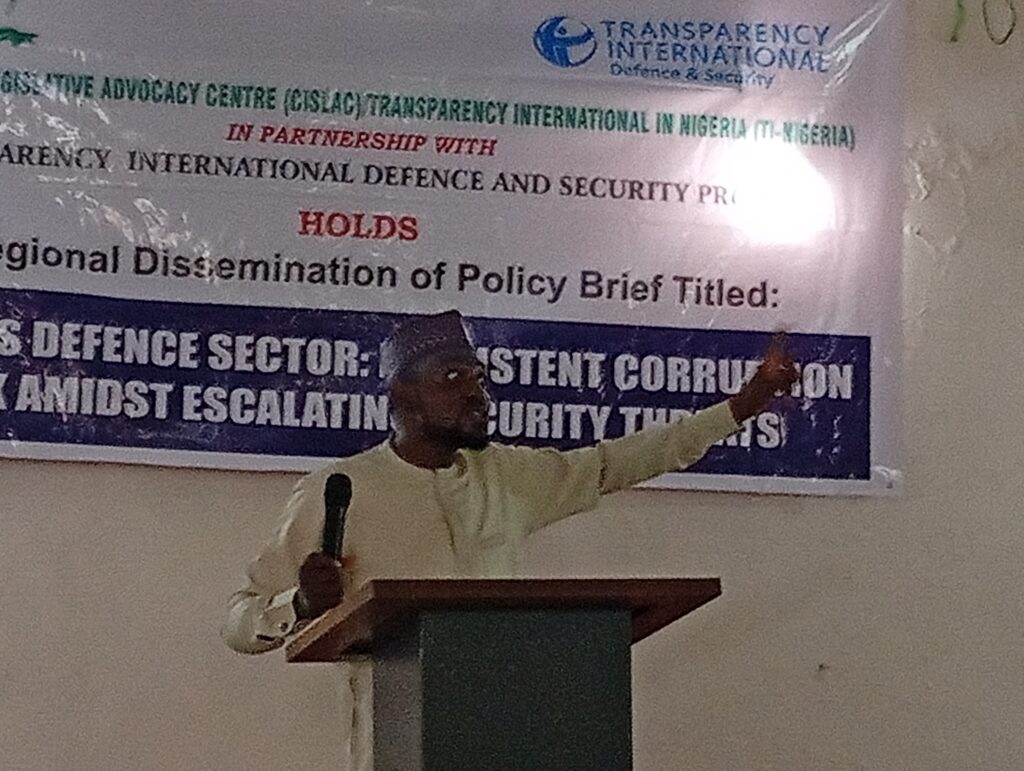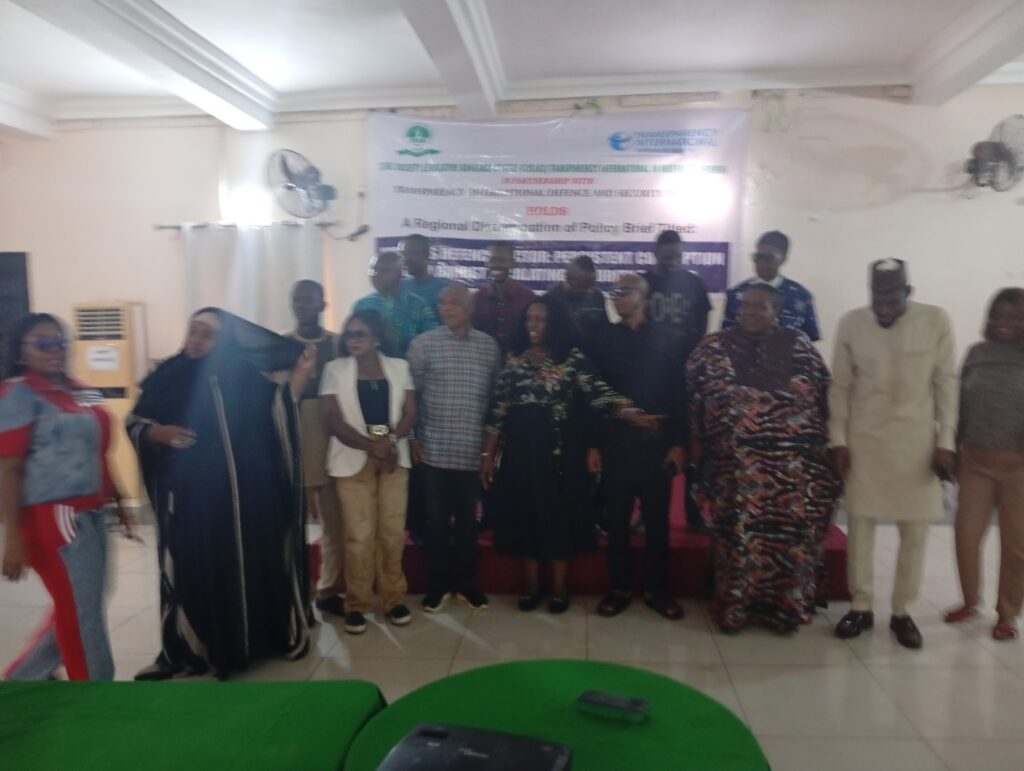An advocacy centre, Civil Society Legislative Advocacy Centre (CISLAC), and Transparency International in Nigeria(TI-Nigeria) have lamented the increasing rate of insecurity in the country, saying that Nigeria spent a total of over US$19.9 billion on security, leads in importation of weapons in Africa, yet, has enormous security challenges.
The group attributed the security challenges in the country to corrupt practices in Nigeria’s Defence and security sector, lamenting that the failure of state security forces to protect local populations from terrorist violence has contributed to the proliferation of self-defence militias and the militarisation of local communities adding that studies have identified corruption as an issue affecting Nigerian public finances, business investment, and standard of living.
These were contained in a statement made available to newsmen on Thursday at the South East regional press conference for the dissemination of a policy brief titled ” Nigeria’s Defence sector persistent corruption risk amidst escalating security threats published by Transparency International Defence and Security programme in collaboration with Civil Society Legislative Advocacy Centre( CISLAC)/ Transparency International in Nigeria ( TI- Nigeria) held in Enugu.
Briefing newsmen, the programme manager, CISLAC, Jimoh Abubakar, who spoke on behalf of the Executive Director CISLAC/ Transparency International Nigeria, Auwal Ibrahim Musa Rafsanjani, said the policy brief highlights findings from the 2020 Government Defence Integrity Index (GDI) that were pertinent for a path to enhanced institutional resilience to corruption in Nigeria’s defence governance. “It is based on a close reading of the GDI results for Nigeria, policy literature, recent news reports, and context and problem analyses conducted by the Civil Society Legislative Advocacy Centre (CISLAC) – the Transparency International (TI) national chapter in Nigeria,” he said.

CISLAC noted that rather than capturing information about one specific area of interest, the GDI captures information about the entire system encompassing defence governance. He revealed that the Key findings showed ,”Nigeria’s defence and security sector is plagued with systemic corruption, a major hindrance to the effective provision of defence in a country facing serious security challenge
” Corruption enmeshes the ever-increasing defence sector expenditure and procurement – activities with little oversight and transparency mechanisms”, a problem he said could be remedied.
” To remedy this, Nigeria’s defence institutions should prioritise transparency and access to information – with a focus on defence budgets and disaggregated expenditures. Strengthening accountability and civilian oversight will be critical to building and sustaining effective institutional resilience in the country’s defence sector,”
Rafsanjani said.
He also disclosed that , “the decades-long struggle with systemic corruption places Nigeria at 145th out of 180 countries in the 2023 Transparency International Corruption Perception Index (CPI), with minimal score changes over the lifetime of the index.
“Pricewater House Coopers finds that corruption could cost the country up to 37% of GDP by 2030 if not addressed.
According to CISLAC boss, key observations from the policy brief revealed that Nigeria faces diverse corruption-induced security and financial issues. “The ongoing corruption, fraud, financial mismanagement, and wider abuse of power within the defence and security sector have exacerbated Nigeria’s numerous security threats and threatened the country’s ability to mitigate escalating violent conflict within its borders”.
Speaking on the armed forces, Rafsanjani said ,”as of 2023, Nigeria had around 135,000 active-duty armed forces However, the ratio of military personnel to population is approximately 1.1 per 1,000 people, far lower than the NATO average of 6 per 1,000 people or more than 20 military personnel per 1,000 people in countries facing conflicts.

The group said the key findings revealed that ,”Nigeria spent a total of over US$19.9 billion on security alone. The military budget was increased from US$2.4 billion in 2020 to a massive US$4.5 billion in 2021, slightly decreasing to US$3.2 billion in 2023.. Nigeria is also the largest arms importer in sub-Saharan Africa, representing 16% of regional imports between 2019 and 2023″.
Giving a clue on the corrupt practices in the Nigerian security sector, CISLAC said, “in its 2022 investigation, the Centre for Democracy and Development (CDD) revealed that about US$15 billion has been squandered through fraudulent arms procurement deals in the last 20 years. It also notes that these and other dealings of Nigeria’s defence and security institutions are shrouded in secrecy.
“The impact of defence procurement-related corruption extends beyond the confines of the sector. In December 2017, US$1 billion was withdrawn from excess crude account with no transparency on allocation nor oversight. Of these US$1 billion, US$500 million was used to pay the US for 12 A-29s Super Tucano aircraft and the remaining US$500 million was unaccounted for and used in the remaining “security vote, ” CISLAC said..
On Human Rights violations by state security forces , the group said there had been concerns over the increasing use of air strikes recently , which have resulted in numerous civilian deaths, using technology and arms supplied by global powers.
“Nigerian military and security forces have also been implicated in violence against civilians, including sexual and gender-based violence”. CISLAC la
measures have been taken to hold security forces accountable for human rights violations, particularly through the Presidential Investigation Panel established in 2017. However, these measures did not yield the desired results, and impunity continues to be an ongoing problem among the armed force.
CISLAC also highlighted issues around personnel management in the armed forces, including faulty recruitment processes, inadequate human resources, and decentralised remuneration systems and structures, saying that the reported irregularities pave the way for corruption.
“GDI data shows that external auditing of defence institutions is compromised by a lack of access and cooperation by the Ministry of Defence (MOD), which regularly refuses to submit documents in a timely fashion and bars auditors’ access to accounts. Moreover, the existing legal provisions in the Nigerian Audit Act were outdated; thus, rendering the Office of the Auditor General for the Nigerian Federation operationally incapable of scrutinising the financial management of the sector.”, CISLAC said.
In partnership with TI-DS with support from the Ministry of Foreign Affairs of Netherlands, CISLAC demanded continue support to national and sub-national stakeholder platforms that engage with the Nigerian government on key issues related to defence and corruption.
This , they said, will allow civil society actors and the media to provide input into national security strategy discussions and implementing policies.
They also demanded adoption of an internationally accepted range of exceptions for defence and security that can be used in the development of legal frameworks, specifically in the right to information (RTI) law or information classification systems.
They demanded adoption of global principles and standards for public disclosure of critical information about the defence sector, including defence budgets, competitive contracting, defence income and foreign assistance, disaggregated expenditures, and asset disposals.
The group demanded guidelines for separating confidential from non-confidential information,a separate legal procedure for monitoring by a confidential senate committee and a unit with suitable security clearance within the Bureau for Public Procurement (BPP) immediate amendments of the Audit Act by the National Assembly to address current trends and challenges, while enhancing the effective functioning of the Office of Auditor General of the Federation to fully interrogate financial management in defence and security sector.
They also advocated harmonisation of legal and policy frameworks governing defence and security; adequate monitoring mechanisms for gender-related compliance in the Defence and Security sector to prevent gender-based violence and abuse during operations; Implementation of the United Nations Security Council Resolution 1325 to adequately integrate women’s participation and representation at all levels of decision making in the defence and security sector: strengthening civilian oversight of the defence sector, both in the legislature and the administration.
The group also demanded strengthening of personnel management systems for both military and civilian personnel, in collaboration with MOD and Armed Forces. Reviewing the legal exemptions in Section 15 of the Public Procurement Law for military and defence purchases and recommending changes that enhance transparency and accountability , among others.
Author: Maureen Ikpeama